Syracuse Hosts World Englishes Conference
Hundreds flock to campus to pay tribute to World Englishes pioneer Braj Kachru
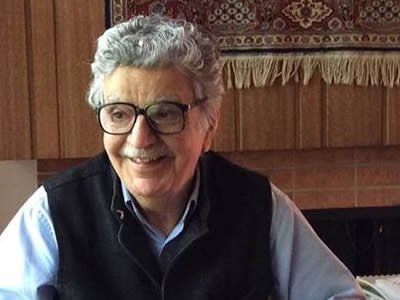
It is a little-known fact that Braj Kachru, a renowned authority on the English language, spoke only Hindi and his mother tongue, Kashmiri, until he was 16. Nevertheless, his upbringing in a Kashmiri Pundit family, which valued education above almost everything else, set the stage for a formidable career in academia. The Indian-born scholar revolutionized the teaching and study of linguistics, English and India studies, before his death last year at the age of 84.
The spirit of Kachru was alive and well, however, at the 22nd annual conference of the International Association for World Englishes (IAWE) at Syracuse University. Organizer Tej Bhatia dedicated the event in memory of Kachru, who co-founded IAWE in 1992 and coined the term “World Englishes” (WE) to refer to emerging localized or indigenized varieties of English.
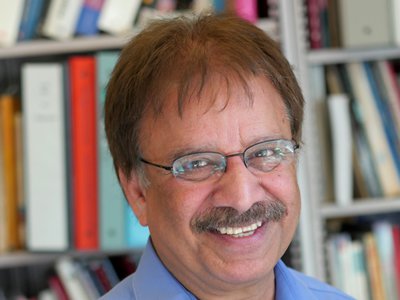
Bhatia, who is IAWE’s vice president and president-elect, as well as chair of the conference’s organizing committee, says the event was a fitting tribute to his friend and colleague.
“Dr. Kachru was a charismatic leader whose teaching, research and scholarship challenged orthodoxies of the English establishment on both sides of the Atlantic,” says Bhatia, professor of linguistics and Hindi in Syracuse’s College of Arts and Sciences (A&S). “By refuting the ‘sacred linguistic cow’ of the native speaker, he argued for a more pluralistic, socially realistic conceptualization, which came to be called the ‘Three Circles Model.’ This model still is widely used today, and categorizes English speakers based on their identities.”
Kachru, who spent most of his career at the University of Illinois at Urbana-Champaign (UIUC), was the subject of a five-hour symposium at the recent weekend conference. Presenters included Ayọ Bamgboṣe, professor emeritus of linguistics at the University of Ibadan (Nigeria) and a recipient of the Nigerian National Order of Merit Award, and Anne Pakir, associate professor and director of English language and literature at the National University of Singapore.
Tributes poured in from other luminaries extolling Kachru’s virtues as a sociolinguist; a multi-linguist; a South Asian linguist; an applied linguist; and a scholar of Kashmiri, a 5,000-year-old, Indo-Aryan language that evolved from Sanskrit.
Kachru also was the namesake of a student award given this year to Wenhan Xie, who researches multilingualism and neurolinguistics at Nanyang Technological University (NTU) in Singapore. The award came with an $800 prize, along with a reimbursement of IAWE’s membership and conference registration fees.
While Kachru’s physical presence was missed by many, the conference seemed to exemplify the extent to which he had built WE into a viable field of study. “It’s something he pioneered and ultimately dominated,” says Bhatia, calling Kachru a “meticulous scholar, an energetic advocate and a seasoned administrator.” “He showed how various English properties, such as phonetics, phonology, morphology and syntax, could impact business, government and academia around the world.”
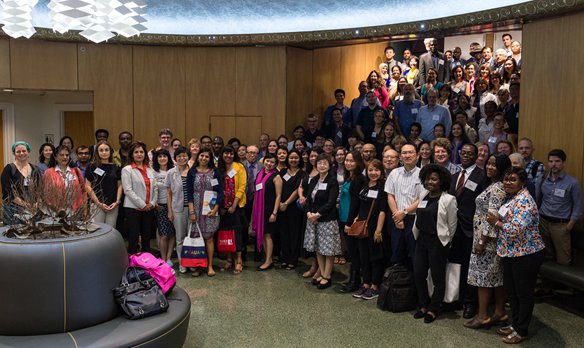
More than 200 presenters from 35 countries converged at Syracuse for the conference, whose theme was “Local and Global Contexts of World Englishes.” The range of the subject matter was reflected in the some 160 papers and two colloquia selected from a field of approximately 300 submissions.
“The global spread of English has led to the development of different approaches to conceptualizing, researching, teaching and learning World Englishes,” says Syracuse Vice Chancellor and Provost Michele Wheatly. “I applaud Tej Bhatia and his colleagues for organizing a conference that reflected this changing sociolinguistic landscape, while honoring the memory of Braj Kachru. The wide range of presenters and attendees bore witness to Dr. Kachru’s contributions to WE, a burgeoning discipline with a worldwide audience.”
Bhatia says the conference’s dual focus on interdisciplinary scholarship and global partnerships resonated with teachers, researchers, scholars and students alike. Many Syracuse attendees were accompanied by their counterparts in the Mellon-funded Central New York Humanities Corridor (Cornell, Rochester, Colgate, Hamilton, Hobart and William Smith, Skidmore, St. Lawrence and Union). Also in attendance were students and faculty from the State University of New York, the City University of New York and New York University.
Topics of discussion ranged from language and educational policy, to information and communication studies, to bio- and sociolinguistics, to electrical engineering.
Surely, Kachru would have approved.
Chin-Woo Kim, a colleague of Kachru’s at UIUC, was one of two distinguished guest speakers. “Rarely have I attended a meeting that was truly as ‘international’ as this one,” says Kim, a world-renowned phonetician and linguist who lectured on the globalization of English. “I’ve been going to these kinds of events for more than 50 years. At Syracuse, I was impressed to see people from so many countries.”
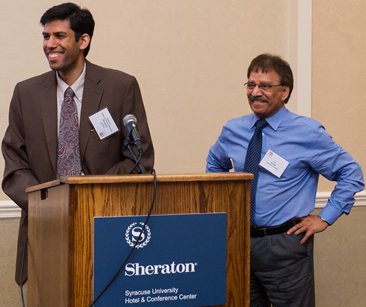
Lav Varshney, the other distinguished guest speaker, echoes these sentiments. The Syracuse-born engineer, who holds multiple appointments at UIUC, lectured on the challenges of mismatched crowdsourcing with automatic speech-recognition technology.
“Lav’s research picks up where Braj’s leaves off—using computational tools for human language processing,” Bhatia says. “[Varshney] is pushing the limits of linguistics with his collaborative work in computer science and programming, mathematics, and language structure and processing.”
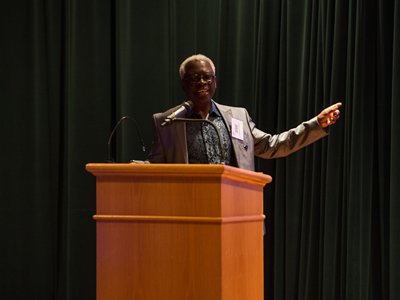
Rounding out the symposium were an array of other notables, including a trio of plenary speakers offering various perspectives on sociolinguistics. Salikoko Mufwene, a biolinguist at the University of Chicago, doubled as the CNY Humanities Corridor Speaker. “He shed light on language evolution and grammaticalization, as they pertain to Atlantic Creoles,” recalls Bhatia, referring to an early generation of North American slaves with cultural ties to Africa, Europe and the Caribbean.
Stony Brook linguist S. N. Sridhar viewed WE through the triple lenses of bilingualism, sociolinguistics and second-language acquisition.
Arizona State sociolinguist Patricia Friedrich explored issues of critical applied linguistics and crosscultural communication, including the social construction of mental illness. “The weekend was a great success,” she notes. “Tej Bhatia and his team managed to make what is intense work and attention to many details look effortless. I was honored to speak at such a wonderful event.”
Adds Sridhar: “The conference was marked by efficiency, professionalism and consideration, which made everything go smoothly.”
The program also featured five Focus Lecturers: Singapore-based child-language researcher Ng Bee Chin, University of Rochester language education expert and Humanities Corridor representative Mary Jane Curry, Michigan State linguist Peter de Costa and Maryland-based early education leaders Anita and Anjali Pandey.
Kingsley Bolton, head of NTU’s Language and Communication Centre, considers the conference a “tremendous success.” “I’ve heard nothing but praise from all the people who have attended,” says the renowned linguist, who co-edits World Englishes (John Wiley & Sons) with IAWE Executive Director Daniel R. Davis. Kachru was the journal's co-founding editor.
An international consultant and guest speaker, Bhatia understands the many moving parts and months of planning that go into such an event. In fact, he organized the last IAWE conference at Syracuse in 2004.
“We tried to make this one broader and more interdisciplinary in scope,” Bhatia says. “We couldn’t have done it without the generous support from our more than two dozen sponsors, from various academic departments and programs across campus to the offices of the Chancellor and Provost. It truly was an all-University effort.”
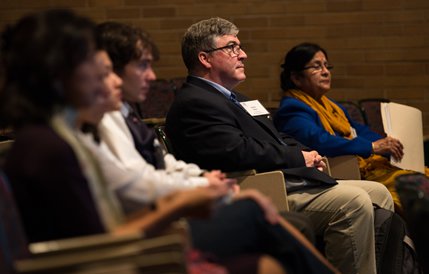
Davis has this to say about the weekend: “IAWE, founded and fostered by Braj B. Kachru and Larry E. Smith, continues a tradition of openness, inclusivity, creativity and a joy in the plurality of Englishes, past and present. The 22nd Conference of IAWE, hosted by Syracuse University, is the latest in a long line of successful conferences in Asia, Africa, Europe and North America. We are grateful to Tej and his team of local organizers for their generosity of time, effort and support in hosting our meeting.”
Perhaps Rajesh Kumar, a linguist at the Indian Institute of Technology in Madras, who studied at UIUC, sums it up the best: “It was an amazing experience—a rich, scholarly tribute to our beloved Professor Kachru.”
Featured
Tej Bhatia Professor Emeritus, Linguistics and Director, South Asian Languages
